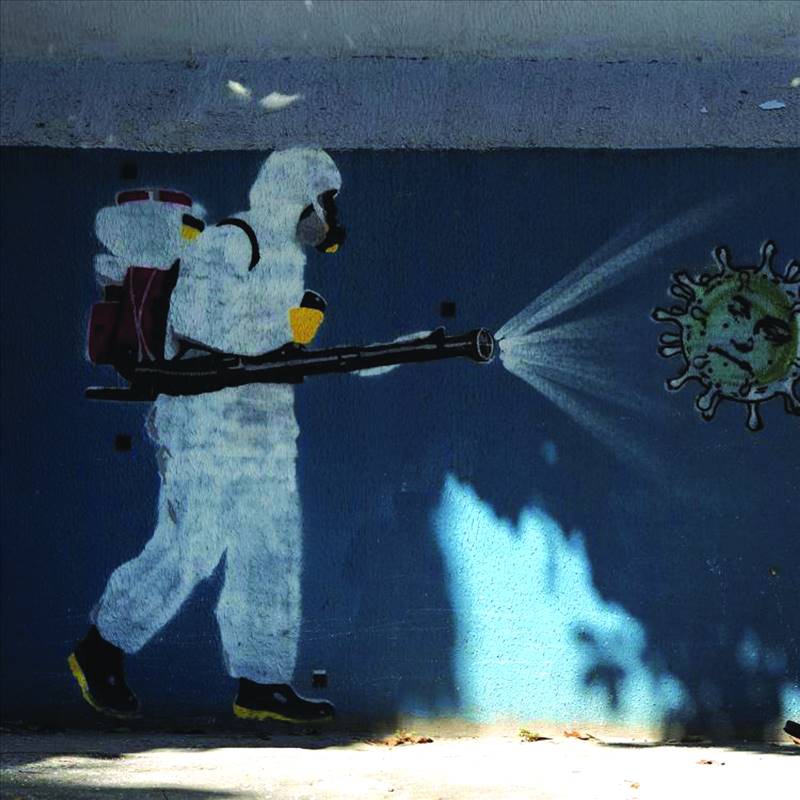
I was on Zoom for my weekly family chat the other day when – mid-sentence – my eyes began to tear up. First one, then another. Within ten seconds, I was snot-crying like Viola David. It caught me off-guard because there was no preamble to the outburst, not even the hint of moistness. It went from desert to flood in under three seconds and I was shook.
The family hadn’t even been talking about anything particularly traumatic and my instinct was to wipe away the tears, dismiss them as one would a passing rain shower. It’s just a short spell, it’ll be over soon. I felt ashamed to be so vulnerable so publicly. My parents were concerned, telling me how proud they were of me and how much they loved me, helpless to reach through the screen for the hug that I knew would have come in the same room. It’s a truism that no matter how old you are, you’ll always feel like a child with your parents, and while this can be irritating when you’re forging your own way in the world, it can also be comforting at times when being an adult is just too hard. We all feel that way some days, and perhaps that’s what allowed a barrage of fear and feeling to course through the momentary crack in my otherwise sturdy forcefield.
I nodded and tried to smile as their pixelated faces on screen, as much to reassure myself that I was fine! Everything is fine! EVERYTHING!
Spoiler Alert: Everything is not fine.
I don’t know exactly what you guys are going though, but I imagine it ain’t great no matter who you are. So let me lay out where I am personally.
For the last six months I have been confined to two rooms that, in their totality, are smaller than the average bed. I have not been outside a ten-block radius of my place and didn’t try because for most of the summer, New York was the setting for Armageddon 2020. I have not not touched another human being by accident or design, except for once when a mentally ill man grabbed my arm in the subway. Nothing in the future is certain. Everything from doctors’ visits to socializing is on screens. Screens are coincidentally also a constant source of trauma as we scroll through video after post, witnesses as white supremacy shrugs off its cloak of invisibility to fight for its throne in plain sight.

It’s a lot, but my circumstances are not unique. Taken together, I and countless others trapped away from their loved ones, are living through what is the definition of solitary confinement.
Solitary confinement – a thing so unnatural that it is used to punish prisoners already inside prison. We are all social animals, and while this state of things may not be new or even avoidable right now, it does mean that merely existing is a feat right now.
I have held on through home workouts, rage, books, cheesecake and the increasingly fragile belief that everything happens for a reason. My routine – wake meditate, eat, work, chat, sleep, repeat – has been the only path on the ground that I’ve found to follow while, all around me, great skyscrapers of institutions have come crumbling down, revealing the ugly, whitewashed truth of how this world really works. Most people would say that I’m overthinking things: that thinking about the social changes of our world is somehow an extracurricular activity, something for other people to do.
I disagree. Last week the NYPD (a police force so famous you already know what the acronym means) endorsed President Trump for reelection. That the police of the largest, most diverse city in the US would endorse a white supremacist affects me, because it affects how I feel when walking thorough the streets for this city forevermore. I feel that way about most of the institutions I’ve known all my life.
I am lucky that it took this many years for that to happen, that I didn’t have to confirm to myself until now what for years so many black and brown people in America knew intrinsically: the United States is not simply racist, it’s built for the advancement of white supremacy. Turns our most of systems in our world are.
“Try and relax” someone said to me later that day in an effort to help, “because clearly your coping mechanisms are not working.”
“Ya, ya” I said, nodding blankly. It was only after I put down the phone that I thought, wait, what?
A coping mechanism only works to let you cope with something temporarily. Eventually, you will have to confront yourself, and your relationship to the world around you. There will inevitably come a time when the defenses you raised to cope will falter and you slump. That’s alright. Maybe that’s you most of the time, and that’s alright too. You know why? Because you get credit for getting through the day. We all do. The upshot of everything going up in flames is that you get to acknowledge, perhaps for the first time in your life, that everything is not OK.
And that’s OK too.
Write to thekantawala@gmail.com
The family hadn’t even been talking about anything particularly traumatic and my instinct was to wipe away the tears, dismiss them as one would a passing rain shower. It’s just a short spell, it’ll be over soon. I felt ashamed to be so vulnerable so publicly. My parents were concerned, telling me how proud they were of me and how much they loved me, helpless to reach through the screen for the hug that I knew would have come in the same room. It’s a truism that no matter how old you are, you’ll always feel like a child with your parents, and while this can be irritating when you’re forging your own way in the world, it can also be comforting at times when being an adult is just too hard. We all feel that way some days, and perhaps that’s what allowed a barrage of fear and feeling to course through the momentary crack in my otherwise sturdy forcefield.
I nodded and tried to smile as their pixelated faces on screen, as much to reassure myself that I was fine! Everything is fine! EVERYTHING!
Spoiler Alert: Everything is not fine.
I don’t know exactly what you guys are going though, but I imagine it ain’t great no matter who you are. So let me lay out where I am personally.
For the last six months I have been confined to two rooms that, in their totality, are smaller than the average bed. I have not been outside a ten-block radius of my place and didn’t try because for most of the summer, New York was the setting for Armageddon 2020. I have not not touched another human being by accident or design, except for once when a mentally ill man grabbed my arm in the subway. Nothing in the future is certain. Everything from doctors’ visits to socializing is on screens. Screens are coincidentally also a constant source of trauma as we scroll through video after post, witnesses as white supremacy shrugs off its cloak of invisibility to fight for its throne in plain sight.

It’s a lot, but my circumstances are not unique. Taken together, I and countless others trapped away from their loved ones, are living through what is the definition of solitary confinement.
Solitary confinement – a thing so unnatural that it is used to punish prisoners already inside prison. We are all social animals, and while this state of things may not be new or even avoidable right now, it does mean that merely existing is a feat right now.
I have held on through home workouts, rage, books, cheesecake and the increasingly fragile belief that everything happens for a reason. My routine – wake meditate, eat, work, chat, sleep, repeat – has been the only path on the ground that I’ve found to follow while, all around me, great skyscrapers of institutions have come crumbling down, revealing the ugly, whitewashed truth of how this world really works. Most people would say that I’m overthinking things: that thinking about the social changes of our world is somehow an extracurricular activity, something for other people to do.
I disagree. Last week the NYPD (a police force so famous you already know what the acronym means) endorsed President Trump for reelection. That the police of the largest, most diverse city in the US would endorse a white supremacist affects me, because it affects how I feel when walking thorough the streets for this city forevermore. I feel that way about most of the institutions I’ve known all my life.
I am lucky that it took this many years for that to happen, that I didn’t have to confirm to myself until now what for years so many black and brown people in America knew intrinsically: the United States is not simply racist, it’s built for the advancement of white supremacy. Turns our most of systems in our world are.
“Try and relax” someone said to me later that day in an effort to help, “because clearly your coping mechanisms are not working.”
“Ya, ya” I said, nodding blankly. It was only after I put down the phone that I thought, wait, what?
A coping mechanism only works to let you cope with something temporarily. Eventually, you will have to confront yourself, and your relationship to the world around you. There will inevitably come a time when the defenses you raised to cope will falter and you slump. That’s alright. Maybe that’s you most of the time, and that’s alright too. You know why? Because you get credit for getting through the day. We all do. The upshot of everything going up in flames is that you get to acknowledge, perhaps for the first time in your life, that everything is not OK.
And that’s OK too.
Write to thekantawala@gmail.com

